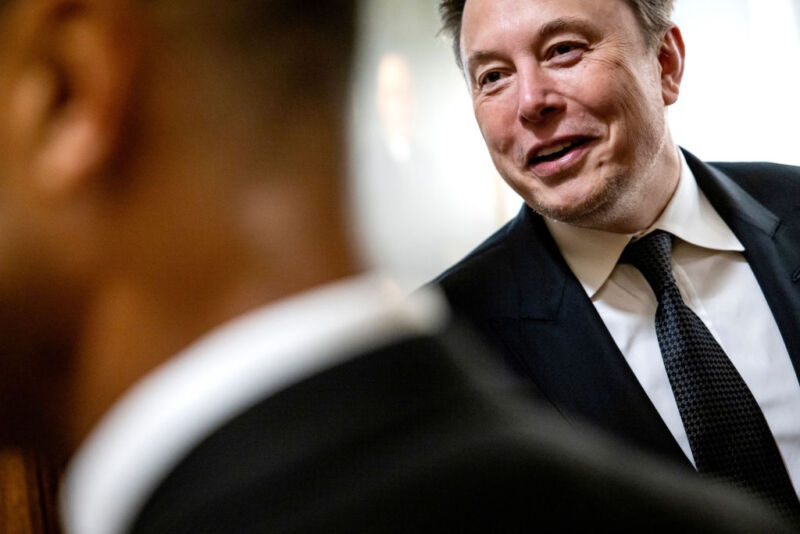No judge with Tesla stock should handle Elon Musk cases, watchdog argues

Elon Musk’s fight against Media Matters for America (MMFA)—a watchdog organization that he largely blames for an ad boycott that tanked Twitter/X’s revenue—has raised an interesting question about whether any judge owning Tesla stock might reasonably be considered biased when weighing any lawsuit centered on the tech billionaire.
In a court filing Monday, MMFA lawyers argued that “undisputed facts—including statements from Musk and Tesla—lay bare the interest Tesla shareholders have in this case.” According to the watchdog, any outcome in the litigation will likely impact Tesla’s finances, and that’s a problem because there’s a possibility that the judge in the case, Reed O’Connor, owns Tesla stock.
“X cannot dispute the public association between Musk—his persona, business practices, and public remarks—and the Tesla brand,” MMFA argued. “That association would lead a reasonable observer to ‘harbor doubts’ about whether a judge with a financial interest in Musk could impartially adjudicate this case.”
It’s still unclear if Judge O’Connor actually owns Tesla stock. But after MMFA’s legal team uncovered disclosures showing that he did as of last year, they argued that fact can only be clarified if the court views Tesla as a party with a “financial interest in the outcome of the case” under Texas law—“no matter how small.”
To make those facts clear, MMFA is now arguing that X must be ordered to add Tesla as an interested person in the litigation, which a source familiar with the matter told Ars, would most likely lead to a recusal if O’Connor indeed still owned Tesla stock.
“At most, requiring X to disclose Tesla would suggest that judges owning stock in Tesla—the only publicly traded Musk entity—should recuse from future cases in which Musk himself is demonstrably central to the dispute,” MMFA argued.
Ars could not immediately reach X Corp’s lawyer for comment.
However, in X’s court filing opposing the motion to add Tesla as an interested person, X insisted that “Tesla is not a party to this case and has no interest in the subject matter of the litigation, as the business relationships at issue concern only X Corp.’s contracts with X’s advertisers.”
Calling MMFA’s motion “meritless,” X accused MMFA of strategizing to get Judge O’Connor disqualified in order to go “forum shopping” after MMFA received “adverse rulings” on motions to stay discovery and dismiss the case.
As to the question of whether any judge owning Tesla stock might be considered impartial in weighing Musk-centric cases, X argued that Judge O’Connor was just as duty-bound to reject an improper motion for recusal, should MMFA go that route, as he was to accept a proper motion.
“Courts are ‘reluctant to fashion a rule requiring judges to recuse themselves from all cases that might remotely affect nonparty companies in which they own stock,'” X argued.
Recently, judges have recused themselves from cases involving Musk without explaining why. In November, a prior judge in the very same Media Matters’ suit mysteriously recused himself, with The Hill reporting that it was likely that the judge’s “impartiality might reasonably be questioned” for reasons like a financial interest or personal bias. Then in June, another judge ruled he was disqualified to rule on a severance lawsuit raised by former Twitter executives without giving “a specific reason,” Bloomberg Law reported.
Should another recusal come in the MMFA lawsuit, it would be a rare example of a judge clearly disclosing a financial interest in a Musk case.
“The straightforward question is whether Musk’s statements and behavior relevant to this case affect Tesla’s stock price, not whether they are the only factor that affects it,” MMFA argued. ” At the very least, there is a serious question about whether Musk’s highly unusual management practices mean Tesla must be disclosed as an interested party.”
Parties expect a ruling on MMFA’s motion in the coming weeks.
No judge with Tesla stock should handle Elon Musk cases, watchdog argues Read More »










